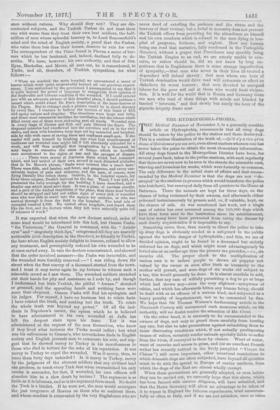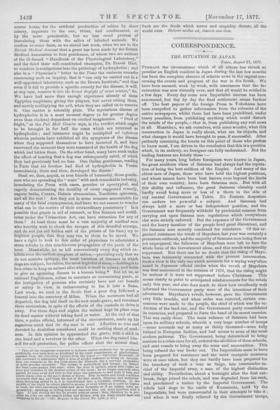THE HYDROPHOBIA-PHOBIA.
THE Medical Examiner of November 3, in a generally sensible article on Hydrophobia, recommends that all stray dogs should be taken by the police to the station and there destroyed. This is a curious illustration of the truth of,—Qu'i/ n'y a l'ien qu'on donne silibdralement que son avis, even about matters whereon one has never taken the pains to obtain the most elementary information. All stray dogs found in the Metropolitan District have been, for several years back, taken to the police-stations, with such regularity that there are never now to be seen in the streets the miserable curs, starving and houseless for weeks, which were formerly so common. The only difference in the actual state of affairs and that recom- mended by the Medical Examiner is that the dogs are not "de- stroyed "at the stations (a process which would transform the police into butchers), but conveyed daily from all quarters to the Home at Battersea. There the animals are kept for three days, on the chance of being reclaimed by their owners, and afterwards either poisoned instantaneously by prussic acid, or, if valuable, kept, on the chance of sale. As was mentioned last week, not a single ease of rabies has ever occurred among the 150,000 dogs which have thus been sent to the institution since its establishment, but how many have been prevented from taking the disease by such timely sequestration it is impossible to say.
Something more, then, than merely to direct the police to take up stray dogs is obviously needed as a safeguard to the public against the terrible danger of hydrophobia ; and this, we are of decided opinion, ought to be found in a decreased but strictly enforced tax on dogs, and which might most advantageously be levied also at an earlier age than the present tax provides,—i.e., six
months old. The proper check to the multiplication of useless curs is to induce people to drown all puppies not valued by the owner as soon after birth as humanity to the mother will permit, and were dogs of six weeks old subject to a tax, this 'Would generally be done. It is almost needle'ss to add, further, that any case of wilfully permitting a dog to go at large which had shown any—even the very slightest—symptoms of rabies, and which has afterwards bitten any human being, should be dealt with as an offence of a serious kind, and subjected to a heavy penalty of imprisonment, not to be commuted by fine. We hope that Sir Thomas Watson's forthcoming article in the Nineteenth Century will recommend such measures which, on his authority, will no doubt receive the attention of Mr. Cross. On the other hand, it is earnestly to be recommended to the owners of dogs, not only to guard them carefully from hurting
any one, but also to take prectionsif not ly predisposing
sin against submitting
those distressing conditions which, causes of rabies, certainly render animals specially liable to suffer from the virus, if conveyed to them by chance. Want of water, want of exercise and access to grass, and (as an excellent French writer has recently noticed in the lively pamphlet " Vivent les Chiens ") still more important, other unnatural restrictions to which domestic dogs are often subjected, have beyond all question much to do with the spread in Europe of canine madness, from which the dogs of the East are almost wholly exempt.
When these precautions are generally adopted, or even before they can be carried out, we earnestly hope that this alarm, which has been fanned with sinister diligence, will have subsided, and that the Home Secretary will allow no advantage to be taken of it to repeat in England the hideous experiments, tried unsuccess- fully so often in Italy, and if we are not mistaken, once or twice
nearer home, for the artificial production of rabies by sheer misery, exposure to the sun, thirst, and confinement, or by the more practicable, but no less cruel process of inoculating them with the saliva of infected animals. We confess to some fears, as we stated last week, when we see in the British Medical Journal that a grant has been made by the British Medical Association to four gentlemen, of whom two are authors of the ill-famed " Handbook of the Physiological Laboratory," and the third their self-constituted champion, Dr. Ernest Hart, to conduct investigations into the pathology of hydrophobia ; and also in a " Physician's " letter to the Times the ominous remarks concerning such an inquiry, that it " can only be carried out in a well-appointed laboratory, such as the Brown Institute," and that even if it fail to provide a specific remedy for the disease, it will, at any rate, remove it into the broad daylight of exact science," &c. We have had more than enough experience already of these Egyptian magicians, giving the plagues, but never curing them, and merely multiplying the evil, when they are called on to remove it. One matter is tolerably plain. The mysterious disease of hydrophobia is in a most unusual degree (a far greater degree even than cholera) dependent on excited imagination. " Died of fright," as the Pall Mall Gazette says, is the verdict which ought to be brought in for half the cases which are returned as hydrophobic ; and instances might be multiplied ad infinitum wherein patients have exhibited all the symptoms of the disease when they supposed themselves to have incurred it, and have recovered the moment they were reassured of the health of the dog which had bitten them. On the other hand, many have sunk under the effect of hearing that a dog was subsequently rabid, of which they had previously had no fear. One Italian gentleman, reading in Paris that his brother had died of hydrophobia in Venice immediately, there and then, developed the disease !
Shall we, then, acquit, as true friends of humanity, those gentle- men who are spreading the " scare" with such remarkable industry, inundating the Press with cases, genuine or apocryphal, and eagerly demonstrating the inutility of every suggested remedy, vapour baths, Curare, Datura stramonium, Xanthium spinosum, and all the rest ? Are they not in some measure accountable for many of the fatal consequences, and have we not reason to wonder what can be the motive of their extraordinary persistency ? Is it possible that grants in aid of research, or free licences and certifi- cates under the Vivisection Aot, can have attraction for any of them ? At least there must be a vast majority of medical men who heartily wish to check the ravages of this dreadful scourge, and do not (as old Selden said of the priests of his time) try to frighten people, that they may run to them to be saved. We have a right to look to this order of physicians to administer a stern rebuke to this mischievous propagation of the panic of the hour. Meanwhile, let us kill remorselessly every dog which ex- hibits even the earliest symptom of rabies,—providing only that we do not mistake epilepsy, the most harmless of diseases to which dogs are subject, for rabies, the most frightful of them,—holding it to be a crime to keep an animal alive which is itself in misery, and liable to give an agonising disease to a human being.* But let us, as rational Englishmen, refuse to entertain an unreasoning panic, at the instigation of persons who certainly have not our benefit or safety in view, in endeavouring to fan it into a flame. Last week, we read in the Secolo that a poor dog followed a funeral into the cemetery of Milan. When the mourners had all departed, the dog laid itself on the new-made grave, and remained there motionless, in spite of the efforts of the custode to drive it away. For three days and nights the animal kept its place over its dead master without taking food or water. At the end of that time, a police official, informed of the circumstance, made up his sagacious mind that the dog must be mad. Affection so true and devoted he doubtless considered could be nothing short of mad. nese. In this opinion he approached the grave, with a stick in one hand and a revolver in the other. When the dog raised him- self for self-protection, the police officer shot the animal dead.
* That all the symptoms supposed to indicate canine madness can be produced artificially, and have been so produced by the cruel experiments of physiologists, appears from the following extract from the Lancet :—"INDUOING MADNX8B.—If one continues to administer daily a dose of alcohol nuffielent to bring on intoxica- tion, one remarks in the dog from about the fifteenth day a nervous excitability of quite peculiar character. The animal is melancholy and uneasy ; be listens, the least noise melee him start; when the door is opened, seized with fright, he runs and crouches In the darkest corner of the room ; he no longer responds when patted, be runs away and trios to bite when one attempts to take hold of him, and utters sharp cries at the mere threat of blows. This irritable and timid condition Increases each day, and from the end of the first month, illusions and hallucina- tions becoming added to it, it is transformed into a veritable delirium, In the middle of the night he utters plaintive moans, or oven whilst all is quiet he begins to bark, the cries becoming louder and more frequent, as if an enemy were ap- proaching ; speaking or calling does not reassure him, one must interfere with a light. At last, during the day he growls without cause ; then, thinking he is pur- sued, be cries out runs scared hither and thither, with his head turned back and snapping in the air."—(Dr. Hagman in the Lancet, No. 2,604, p. 411.) Such are the deeds which terror and stupidity dictate, all the world over. .Doloria modus est, timoris non item,







































 Previous page
Previous page